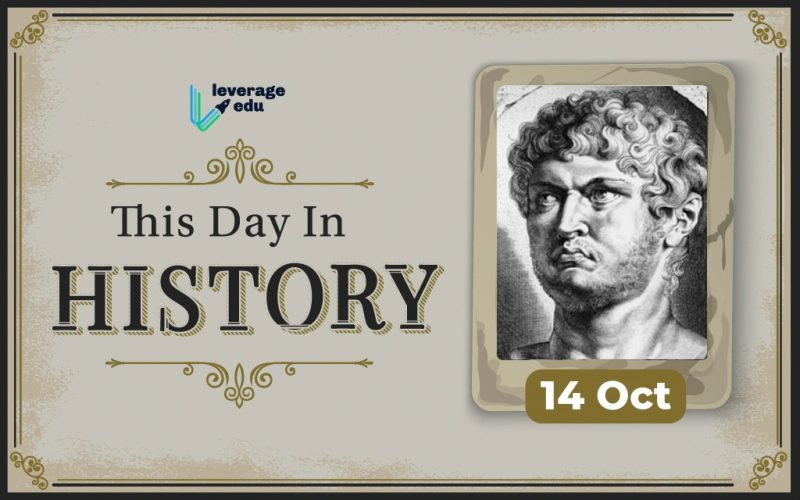“What is history? An echo of the past in the future; a reflex from the future on the past” – Victor Hugo! Did you know that Martin Luther King Jr, one of the most visible spokesmen and leaders in the American civil rights movement was awarded the Nobel Peace Prize on this day in history? The only way to treasure our roots and accomplishments is to remember our past, so let’s learn about the remarkable events that influenced this day in history, October 14!
What Happened in India on October 14?
1882: The University of Punjab was Founded
On this day in history, the University of Punjab was founded which is now situated in present-day Pakistan.

1953: Demise of Raghunath Dhondo Karve
Raghunath Dhondo Karve was a professor of mathematics and a social reformer from Maharashtra, India.
1956: BR Ambedkar Converted Himself to Buddhism
Indian social reformer B.R. Ambedkar along with 500,000 supporters converted themselves to Buddhism in Nagpur, India on October 14, 1956.

Also read about the events that happened on October 10, October 8, October 7 and October 6
What Happened Around the World on October 14?
1066: Battle of Hastings
William, Duke of Normandy and his Norman army defeated the English forces of Harold II on October 14, 1066, who was killed in the battle.
1468: Treaty of Peronne
The Treaty of Peronne was signed between Duke Charles the Stoute & French King Louis XI.
1492: Christopher Columbus
Christopher Columbus left San Salvador and arrived in Santa Maria of Concepcion (Bahamas) on October 14, 1492.
1892: The Adventures of Sherlock Holmes
Arthur Conan Doyle published his ever so famous “The Adventures of Sherlock Holmes“, a collection of 12 stories which was originally published serially in “The Strand Magazine.”

1926: Winnie the Pooh
A. A. Milne’s fiction book “Winnie the Pooh” was released on October 14, 1926.
1933: Nazi Germany announced its withdrawal from the League of Nations.
1940: Hitler Will Have to Break Us or Lose the War
Balham tube station in London was bombed by the German Luftwaffe during the Blitz on October 14, 1940, killing 64-66 people.
1952: Unité d’Habitation
The Unité d’Habitation, built by Le Corbusier and inaugurated in Marseille, France, is one of the most influential Modernist buildings.

1957: Queen Elizabeth II Became the 1st Canadian Monarch
Queen Elizabeth II became the first Canadian monarch to open the Parliament of Canada with the Speech from the Throne.
1964: Nobel Peace Prize to Martin Luther King Jr.
Martin Luther King Jr. was announced as the winner of the Nobel Peace Prize on October 14, 1964.
1976: Milton Friedman
Nobel Prize in Economics was awarded to American economist Milton Friedman.
1986: Elie Wiesel
Nobel Peace Prize was awarded to Auschwitz survivor Elie Wiesel, for his efforts to ensure the Holocaust was remembered.
1991: Aung San Suu Kyi
Burmese opposition leader and social activist Aung San Suu Kyi won the Nobel Peace Prize on October 14, 1991.
2014: Ebola Virus
World Health Organization announced that the Ebola virus death toll at 4,447, and the fatality rate had reached 70%.
2019: Nobel Prize for Economics
Nobel Prize for Economics was awarded to Esther Duflo, Abhijit Banerjee and Michael Kremer for research on ways to fight poverty.
Famous Birthdays
1906: Hannah Arendt
Hannah Arendt was an American political theorist who was born in Germany. Many of her publications and essays have influenced political theory and philosophy for decades.

1939: Ralph Lauren
Ralph Lauren, KBE is an American fashion designer, philanthropist, and billionaire businessman best known for his multi-billion-dollar Ralph Lauren Corporation.

1981: Gautam Gambhir
Gautam Gambhir is an Indian politician and former Indian cricketer, who has played all formats of the game.
We hope you enjoyed reading about the significance of October 14 in history. For more exciting articles related to history and education, follow Leverage Edu on Facebook, Youtube, Instagram, and LinkedIn.

 One app for all your study abroad needs
One app for all your study abroad needs



























 45,000+ students trusted us with their dreams. Take the first step today!
45,000+ students trusted us with their dreams. Take the first step today!


